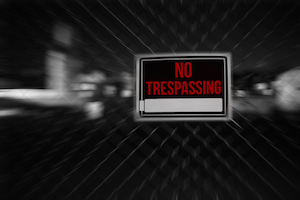Trespassing on Property West Palm Beach Criminal Lawyers

When we go to an outdoor mall or an outdoor amusement park, you might notice off-duty police officers in uniform or security guards standing around. These individuals are there to keep the location fun and inviting for families. When something happens, say a heated argument or the use of profanity, security responds to the scene and asks individuals to leave. At this point, they have been warned, and if they stay, they can be arrested for trespassing.
Other situations where this statute comes into play are with construction sites, wooded vacant lots, farmland, the front yard of people’s houses, or fenced fields.
What the State Prosecutor has to Prove to Convict You for Trespassing
The state prosecutor has to prove beyond a reasonable doubt:
- You willfully entered into or stayed on property that is not a structure or conveyance;
- The property was owned or lawfully possessed by another person;
- Your entering or remaining was without authorization, license, or permission; and
- Either:
- Notice to not enter or not stay on the property was given; or
- The property was unenclosed curtilage of a home and you entered to commit a crime other than trespass.
Willfully
“‘Willfully’ generally, and as used in this trespass statute, refers to a general intent and merely means . . . the entry or remaining be intentionally, knowingly and purposely done.” Rozier v. State. This means that you cannot accidentally or mistakenly trespass.
Notice
A warning notice to not enter can be given different ways. One way is that the notice can be given verbally. The warning cannot be from just anyone. A warning has to come from the owner, a lessee of the property, or a person authorized by the owner.
A notice can also come from posted signs. Florida Statute 810.011 provides specific guidelines as to the requirements for a sign to be considered a posted sign to warn trespassers. This also creates problems when the person is on commercial property and there are “No Trespassing” signs. Commercial properties such as gas stations, supermarkets, malls, etc. are considered quasi-public and they impliedly invite everyone in to conduct business. During normal working hours, unless someone authorized warns the person to leave, the person cannot be trespassing on quasi-public property. See Smith v. State. If the signs are for a construction site, Florida Statute 810.09(2)(d), the signs must follow what the statute requires or the sign could not have given adequate notice. See Higgs v. State. This is what was argued successfully (case dismissed) by one of our attorneys in a trespassing case because the warning sign did not meet the requirements in the statute.
Fencing around a property can also provide notice. Fenced land is land fenced with logs, rails, posts, barbed wire, electric wire, etc. that is at least 3 feet high. The fencing does not have to fence any boundary formed by water.
Cultivated land is farmland such as sugar cane fields, corn fields, etc. Cultivated land is land “cleared of its natural vegetation, and at the time of the trespass was planted with trees, a crop, an orchard or a grove, or was a pasture.” It makes sense that cultivated lands provide notice because (1) people do not spend money and time farming land that is not their land, (2) it would be difficult to drive farming equipment around with posts and fencing everywhere, and (3) the fencing and signs would cost the farmers a fortune to put up and maintain.
Defenses
There are many defenses to trespassing on property other than structure or conveyance such as:
- The posted signs were not done according to the statute.
- You did not willfully enter the property.
- You were invited to come onto the property.
- The person who asked you to leave was not properly authorized to ask you to leave.
- The warning was not communicated. See K.M.B. v. State.
Punishment
Trespassing on property other than a structure or conveyance is a first-degree misdemeanor which is punishable up to 365 days in prison and a $1,000 fine.
If you trespassed on property that was a construction site, commercial horticulture property, agricultural site for testing, a domestic violence center, or agricultural chemicals manufacturing facility and the property was legally posted, the crime is a third-degree felony that is punishable up to 5 years in prison and a $5,000 fine.
Contact the Law Office of Roger P. Foley, P.A.
Trespassing crimes can be defended. You will want serious attorneys defending you. If you have been arrested and charged with this crime, call our law offices today so you can schedule a 5 minute free consultation with one of our attorneys. We want to talk to you to find out your version of the events. From that information we will further refine your defense. We will try to persuade the prosecutor to drop your case; otherwise, we can take the case all the way to trial. Every case is different and our goal is always to Prove Your Innocence.


 Roger P. Foley Home
Roger P. Foley Home






